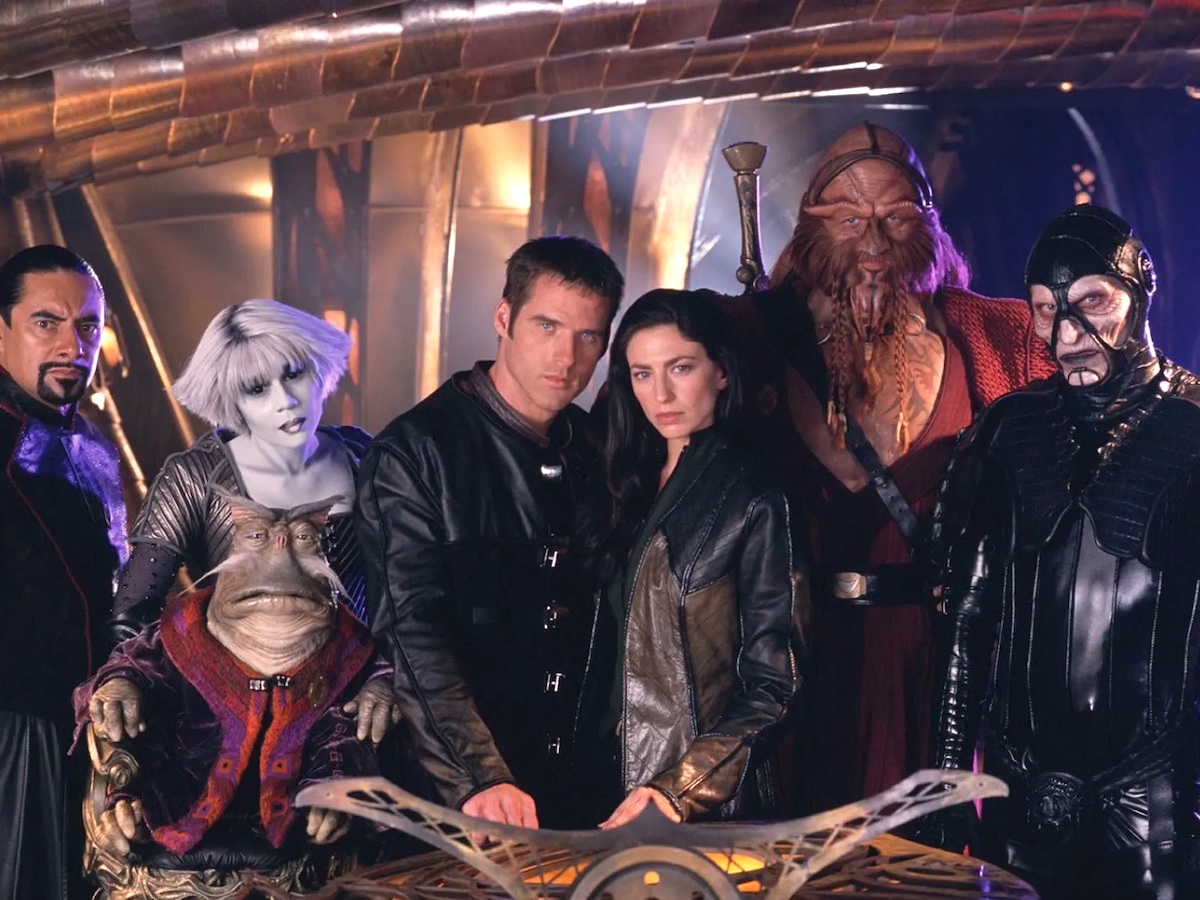This Perfectly Weird Sci-Fi Show Should Be Your Next Apple TV+ Watch
My name is John Crichton, an astronaut. A radiation wave hit...

High school was the peak of my TV obsession—never did shows loom so all-consuming, even in the nascent days of the Internet and online fandom. Appointment television was pretty much the only way to watch, so my weeks were scheduled around catching new episodes of my favorite shows.
My favorite show, beyond any shadow of a doubt, was Farscape, about Earth astronaut John Crichton (Ben Browder) flung into a galaxy far, far, far away and trapped with a motley cast of fascinating aliens and even more fascinating puppets. His entrance into distant space sets off a chain of events that finds him on board a unique ship crewed by escaped prisoners, and, as the opening monologue has burned into my brain, “hunted by an insane military commander.” Now you—yes you!—have the chance to journey through the wormhole into Farscape on Apple TV+. Weird, wacky, wonderful, hilarious, heartbreaking, and ahead of its time, Farscape deserves the massive audience that it was denied upon original airing.
Farscape aired on the SciFi channel from 1999-2003. After it was tragically and unceremoniously canceled (an occurrence that was actually tragic to me; I sobbed watching the season 4 cliffhanger episode that became the series finale), Farscape just wouldn’t die. Its upstart spirit and dedicated fandom kept the fires burning. A three-hour miniseries, Farscape: The Peacekeeper Wars, was produced to help wrap up the story, and for the last twenty years, comics and novelizations have continued to tell tales in the Farscape universe. I’ve argued that the show deserves a revival in our age of media second lives:
Farscape was a bit too much of an acquired taste for its time and limited distribution, which preceded the social media Internet. I whole-heartedly believe that if it was revived today, the show’s mix of space operatic melodrama, winking weirdness, and clever humor would garner the attention it deserved, and streaming services would ensure that it was accessible to many.
In the streaming era, Farscape was made more accessible than teenage me could’ve ever dreamed—a friend once paid over a hundred dollars for official videotapes of a handful of season one episodes, if you want to know what it was like to be a fan of genre television in the ’90s. (It involved a lot of videotapes.) The show has been on Amazon Prime Video for the last few years, to the delight of viewers old and new, but I was thrilled to see that Farscape recently also made the leap to Apple TV+ and is currently #3 on iTunes, according to FlixPatrol.
Apple TV+ has built up quite a science fiction-skewing audience, with the likes of Silo, Foundation, Severance, For All Mankind, Invasion, and a heavy genre focus in general—see: Changeling, Servant, See, Schmigadoon—so I’m hoping that its built-in viewership will take the Farscape plunge. There is, quite simply, nothing else like Farscape, which blends humor and pathos to such an extent that we once got a full-on jump into Looney Tunes-esque cartoon sequences playing out in the mind of a tortured character.
A note to those who may tune in to watch Farscape for the first time: the show ages like a fine wine if you give it room to breathe. These days, we’re used to short seasons and splashy productions of series made with prestige movie budgets. TV shows often used to take a while—sometimes, seasons—to find their footing and their voice. Upon revisiting Farscape, I was surprised how many episodes in season one were of a “planet/villain of the week” variety. But the team-building that takes place therein is more than worth it, as are the bizarre and fantastically populated places the crew of the living spaceship Moya visit. The later seasons are confident and sure-footed, with Farscape having grown up into something special.
The characters on Farscape change in ways that feel organic and achingly real, and it is always astonishing to experience that two of the most compelling characters—Pilot and Rygel—are actual muppets (The Jim Henson Company co-produced the show). In a time when we bemoan rushed visual effects and the production-crunch stress placed on those artists, it is absolutely a trip to a different universe to witness how seamlessly puppets become vital members of an otherwise flesh-and-blood crew. People’s (and puppets’) lives are complicated on Farscape; for every silly, body-swapping episode, there is a wrenching rumination on war, “peacekeeping,” loss, and love. The central love story—featuring Browder’s blustery but bewildered Crichton and Claudia Black’s slow-thawing former soldier Aeryn Sun—is one of my favorites to have watched evolve on television. Ever.
It can feel sometimes like there’s so much to watch now that we’ll never catch up. But there are also days when it seems like there’s nothing that catches your fancy and you find yourself scrolling listlessly through streamer menus. Well, there are now 88 episodes of Farscape, broadcasting on Apple TV+ from a different time and a wildly different place, to keep you entertained for the foreseeable future. And who knows? If enough of us start watching and making noise about it, Farscape could take some new, as yet unimagined form. I know it still has stories left to tell.
(image: SciFi/Syfy)
Have a tip we should know? tips@themarysue.com